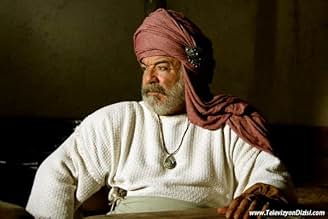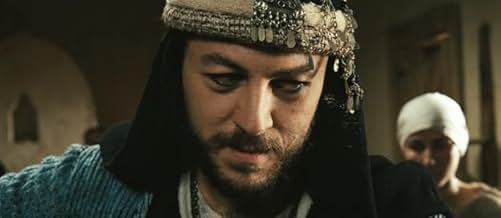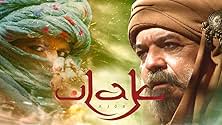Agrega una trama en tu idiomaIn a place where there is no time, a traveler comes to an unnamed village where we do not know where on the map. The weary traveler is a messenger. They have stories to tell, words to say.In a place where there is no time, a traveler comes to an unnamed village where we do not know where on the map. The weary traveler is a messenger. They have stories to tell, words to say.In a place where there is no time, a traveler comes to an unnamed village where we do not know where on the map. The weary traveler is a messenger. They have stories to tell, words to say.
- Dirección
- Guionista
- Elenco
- Premios
- 2 premios ganados y 9 nominaciones en total
Zuhal Gencer
- Cemile
- (as Zuhal Gencer Erkaya)
Yagiz Atakan Savas
- Ferhat
- (as Atakan Yagiz)
- Dirección
- Guionista
- Todo el elenco y el equipo
- Producción, taquilla y más en IMDbPro
Opiniones destacadas
First of all I'm really happy to see that Turkish cinema has reached international standards in terms of technical features of film making. The movie "Ulak" has very decent camera work, lighting, costumes and scene creation. Almost half of the movie is shot in the night and everything is well done. We can see every bit of the scene yet we're convinced that it's dark. This is not we're used to see is Turkish film making.
Now let's come the movie itself. I'd never seen a Cagan IRMAK(the director) movie before. I did not have any expectations actually. I was very much neutral. After watching the movie I questioned myself and thought about it over and over but I could not figure out what all it was about! There is a promising story but it is very vague. One can get different messages from it or not. Neither I can say who the people are in the movie nor what the era it is they live in. It looks like they are one of the Turkish tribes before Ottoman Empire living in southern parts of Anatolia. But no one can say it is for sure. So, place, characters and the time is not so clear to the audience. Therefore we cannot know what to expect or how to interpret the story.
And my last but not least complaint is, and I think this is the biggest problem of Turkish Cinema, the movie looks much more like a theater play than a cinema movie. Let me say why; most of the cast is coming from theater origin yet this is the least important cause of the problem. It doesn't feel like "Cinema" because it's shot in almost three places, a hand build village stage, a barn yard and some very short outside shots. Acting can be considered quite well if they were on the stage of the theater, in front of the audience. But the acting is much more dramatic than it should. One might say it's epic, but I could not see where the saga is.
So, our directors are so keen to shot sagas and tales but before that they ought to learn how to tell a story on the big screen in a solid manner. But of course, they need to have a solid story and scenario beforehand.
Now let's come the movie itself. I'd never seen a Cagan IRMAK(the director) movie before. I did not have any expectations actually. I was very much neutral. After watching the movie I questioned myself and thought about it over and over but I could not figure out what all it was about! There is a promising story but it is very vague. One can get different messages from it or not. Neither I can say who the people are in the movie nor what the era it is they live in. It looks like they are one of the Turkish tribes before Ottoman Empire living in southern parts of Anatolia. But no one can say it is for sure. So, place, characters and the time is not so clear to the audience. Therefore we cannot know what to expect or how to interpret the story.
And my last but not least complaint is, and I think this is the biggest problem of Turkish Cinema, the movie looks much more like a theater play than a cinema movie. Let me say why; most of the cast is coming from theater origin yet this is the least important cause of the problem. It doesn't feel like "Cinema" because it's shot in almost three places, a hand build village stage, a barn yard and some very short outside shots. Acting can be considered quite well if they were on the stage of the theater, in front of the audience. But the acting is much more dramatic than it should. One might say it's epic, but I could not see where the saga is.
So, our directors are so keen to shot sagas and tales but before that they ought to learn how to tell a story on the big screen in a solid manner. But of course, they need to have a solid story and scenario beforehand.
That was what Cagan Irmak said before the movie was seen "if you are expecting clichés, you will not be satisfied". This movie was totally different. The style, the life, the people in the movie was kind of weird. However, everything was great, well prepared. Movie tells a tale about a "messenger" in ancient times. The tale tells people every side of a life, a woman lets men use her daughter for money, a bad man, a crazy woman, a boy and a girl that can not be together... Cetin Tekindor (Zekeriya) played nearly perfect in the movie. In addition, kids played their roles awesome. They were too natural, and they were living the environment. The soundtracks are great, images are impressive. One of the bests, 9/10.
Set in an unspecified medieval period, ULAK centers on Zekeriya, a doctor (Çetin Tekindor) who visits a village and begins to tell mysterious stories of the past, present and future to a group of children and adults. The stories focus on the power of God, the importance of remaining true to oneself and the need to overcome tyranny. The center of his tales is a crippled character Murad (Ömer Hüsnü Turat) who possesses some kind of spiritual power despite his disability.
Zekeriya's presence within the community immediately causes suspicion: what kind of power does he have over the children? For the village elders, accustomed to wielding their patriarchal power over their women and their offspring, he represents a subversive force, and therefore needs to be removed. The only snag is that he possesses the kind of resilience that is infectious - so infectious, in fact, that he encourages the children to resist their parents. Young Ferhat (Atakan Yağız) offers a case in point - despite his father's attempts to beat him into submission, he remains unbowed, and eventually departs with Zekeriya to a better world.
Part-fantasy, past religious epic, Çağan Irmak's film underlines the importance of being true to oneself, even if life's circumstances turn against you. This is way Zekeriya preaches, using his autobiographical experiences with Murad as an example. Tyrannies will never survive in a world whose inhabitants understand the existence of a higher power in whom they can trust. Such views are not only religiously important, they have an intimate bearing on contemporary politics. The film's ending is particularly satisfying, as the children and the believers go forth into a promised land, leaving the former tyrants and their families to die. ULAK is particularly harsh on those who simply follow popular sentiment without understanding anything about themselves or the societies they inhabit. They are at once the least intelligent yet most dangerous of people.
To be honest, some of the action is a little sentimental, adumbrating some of Irmak's later work such as THE SLEEPING PRINCESS (PRENSES'IN UYKUSU), especially towards the end of the the film when Zekeriye reveals the ending to his tale to the accompaniment of swirling violins on the soundtrack. There is also the question of the film's epigraph, dedicated to all children with the capacity to dream; on this view, Irmak suggests that all adults have somehow been corrupted and it is incumbent on the younger generation to create a better world. This might be true, but it suggests a view of childhood with its roots in European Romanticism rather than spirituality.
Zekeriya's presence within the community immediately causes suspicion: what kind of power does he have over the children? For the village elders, accustomed to wielding their patriarchal power over their women and their offspring, he represents a subversive force, and therefore needs to be removed. The only snag is that he possesses the kind of resilience that is infectious - so infectious, in fact, that he encourages the children to resist their parents. Young Ferhat (Atakan Yağız) offers a case in point - despite his father's attempts to beat him into submission, he remains unbowed, and eventually departs with Zekeriya to a better world.
Part-fantasy, past religious epic, Çağan Irmak's film underlines the importance of being true to oneself, even if life's circumstances turn against you. This is way Zekeriya preaches, using his autobiographical experiences with Murad as an example. Tyrannies will never survive in a world whose inhabitants understand the existence of a higher power in whom they can trust. Such views are not only religiously important, they have an intimate bearing on contemporary politics. The film's ending is particularly satisfying, as the children and the believers go forth into a promised land, leaving the former tyrants and their families to die. ULAK is particularly harsh on those who simply follow popular sentiment without understanding anything about themselves or the societies they inhabit. They are at once the least intelligent yet most dangerous of people.
To be honest, some of the action is a little sentimental, adumbrating some of Irmak's later work such as THE SLEEPING PRINCESS (PRENSES'IN UYKUSU), especially towards the end of the the film when Zekeriye reveals the ending to his tale to the accompaniment of swirling violins on the soundtrack. There is also the question of the film's epigraph, dedicated to all children with the capacity to dream; on this view, Irmak suggests that all adults have somehow been corrupted and it is incumbent on the younger generation to create a better world. This might be true, but it suggests a view of childhood with its roots in European Romanticism rather than spirituality.
First of all, the ''Turkish Cinema'' had produced the same things throughout. But this idea of making something different contrary to the meaningless, cheap movies of bad filmmakers is a very venturous business. I think that we owe Çağan Irmak therefore a debt, because his early work was ''Babam Ve Oğlum'', which was very successful in the box-office. Irmak has tried something at least but the transformation of the idea of telling a myth is done very bad to a movie. The development of the movie is very choppy, the characters are sketchy without any deepness, the music was predominantly weird and the overall performance of the actors were common to bad. But the biggest point is, that the movie was too theatrical. This attribute is not appropriated to cinema,you can find it in theaters. The director wanted to give the messages in a artless way, which made some scenes and the filmmaker funny. All in all it's a good try but nothing more...
I am pretty sure Chagan Irmak was aware of the fact that the movie is completely different than what people was expecting. He is brave enough to discuss the issues like freedom of speech, military coups in his movies explicitly. But this time, he was indirect and he makes people to think. In most of the Turkish movies, it is a tradition to give the message in a direct way. But this makes Ulak special .. Irmak breaks those traditions. The photography, costumes are were great. Throughout the movie, I tried where/when the story takes place. What is their religion? I liked that disturbance in my mind. which make me to think and I enjoyed my mind trip!
Selecciones populares
Inicia sesión para calificar y agrega a la lista de videos para obtener recomendaciones personalizadas
Detalles
Taquilla
- Total a nivel mundial
- USD 3,248,267
- Tiempo de ejecución
- 1h 49min(109 min)
- Color
- Relación de aspecto
- 2.35 : 1
Contribuir a esta página
Sugiere una edición o agrega el contenido que falta










